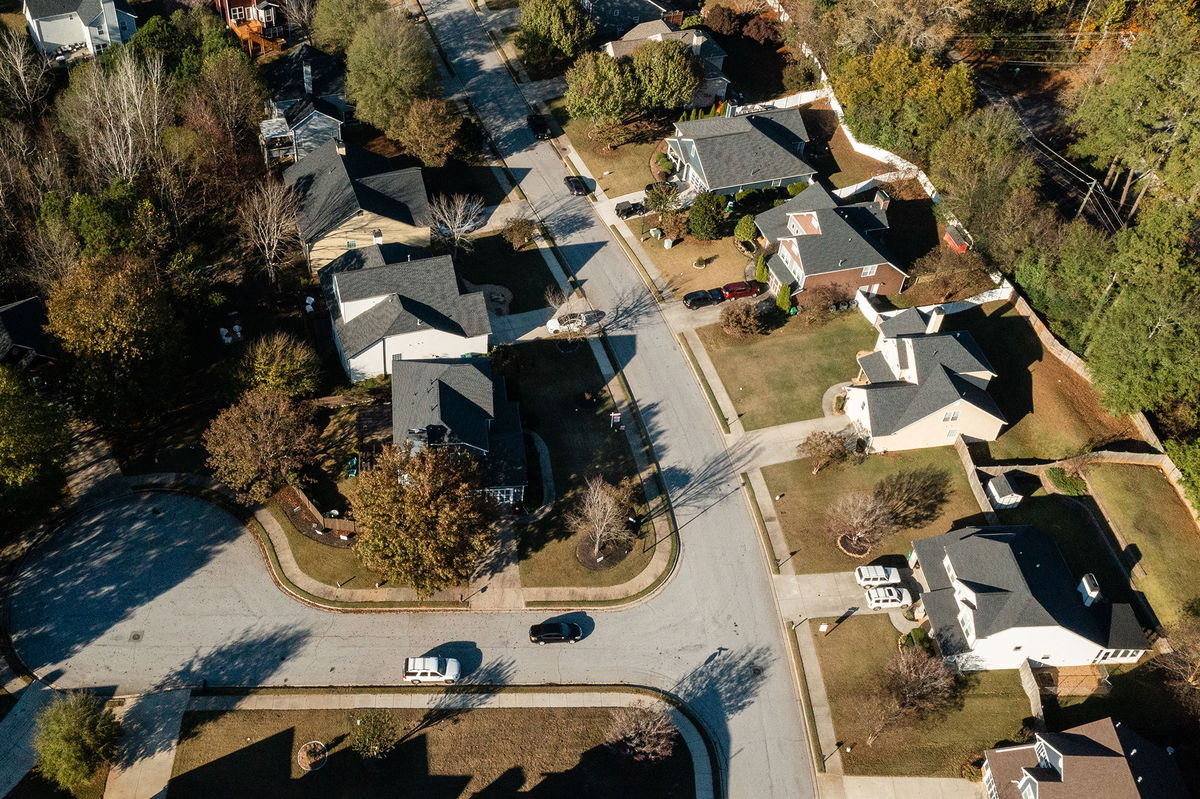US home prices fell in January for the seventh-straight month

US home prices fell for the seventh month in a row in January. Pictured is a subdivision in Atlanta
By Anna Bahney, CNN
US home prices fell for the seventh month in a row in January, even as mortgage rates eased, according to the latest S&P CoreLogic Case-Shiller US National Home Price Index, released Tuesday.
After seasonal adjustment, the National Index posted a month-over-month decrease of 0.2%.
“2023 began as 2022 had ended, with US home prices falling for the seventh consecutive month,” said Craig Lazzara, managing director at S&P Dow Jones Indices.
But still, only 15 out of 20 cities in the index reported month-to-month declines. Prices in Atlanta and Chicago were flat from December, while Miami; Boston; Cleveland and Charlotte, North Carolina, had slight increases.
Prices are still rising on a year-over-year basis. But the amount of that price growth has been getting smaller for the past several months.
The National Home Price Index, covering all nine US census divisions, reported a 3.8% annual gain in January from the year before, but that is down from a 5.6% annual gain in the previous month. In the index of the top 20 cities, all cities saw lower prices in the year ending January 2023 versus the year ending December 2022.
Miami; Tampa, Florida; and Atlanta again reported the highest year-over-year gains among the 20 cities in January. Miami had a year-over-year price increase of 13.8%, followed by Tampa with a 10.5% increase and Atlanta with an 8.4% increase.
At the other end of the spectrum, home prices on the West Coast show continued weakness. Several cities are saw home prices in January drop from the year before, with San Francisco down 7.6%. It was followed by Seattle down 5.1%, San Diego down 1.4% and Portland down 0.5%.
As a result, the Southeast continues as the country’s strongest region, while the West continues as the weakest.
“January’s home price weakness is yet more proof of the doldrums the housing market was stuck in during the fall and winter, when buyers and sellers were forced to come to terms with a new, relatively higher-interest-rate environment,” said Jeff Tucker, senior economist at Zillow.
Home prices have been falling as a result of the Federal Reserve’s historic effort to rein in inflation. That battle has caused mortgage rates to spike over the past year, resulting in many home buyers being priced out of purchasing a home.
Typically, when demand drops, supply swells and prices go down. But fewer homes are coming to market for sale because ultra-low interest rates over the past few years are causing many home owners to stay put, keeping the inventory of homes stubbornly low.
This was all before banks began failing in March, the impact of which is obviously not reflected in January’s data.
“Financial news this month has been dominated by ructions in the commercial banking industry, as some institutions’ risk management functions proved unequal to the rising level of interest rates,” said Lazzara. “Despite this, the Federal Reserve remains focused on its inflation-reduction targets, which suggest that rates may remain elevated in the near term.”
As a result, said Lazzara, mortgage financing and the prospect of economic weakness are likely to remain a headwind for housing prices for at least the next several months.
Mortgage rates are expected to be volatile for as long as the Fed has to work to pull back runaway inflation. Rates had been rising in February as inflation did not seem to be cooling as much or as quickly as expected. But when banks collapsed in March the uncertainty in the financial sector caused investors to take actions that resulted in mortgage rates ticking down in recent weeks.
“As the market comes back to life this spring, prices are likely to rise month over month, but fall year over year, compared to last year’s frenzied spring shopping season when buyers raced to lock in lower mortgage rates,” said Tucker. “Just how much prices will rise from winter lows will depend on whether mortgage rates stabilize and creep downward or stay high and volatile.”
The-CNN-Wire
™ & © 2023 Cable News Network, Inc., a Warner Bros. Discovery Company. All rights reserved.